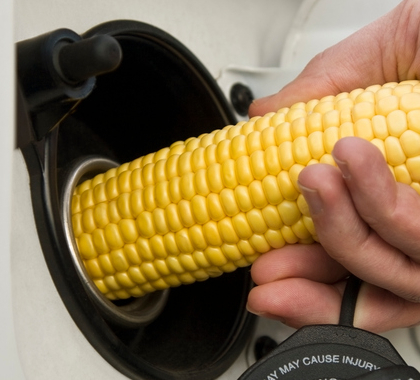Adding ethanol to or substituting corn-based ethanol for gasoline increases greenhouse gas emissions compared to gasoline sans ethanol, reports a new study published in the Proceedings of the National Academy of Sciences.
The study found that the Renewable Fuel Standard (RFS), which specifies the amount biofuels be added to transportation fuel in the United States, thereby guiding nearly half of all global biofuel production, resulted in 24 percent higher greenhouse gas emissions from the transportation sector than would have occurred absent the mandated substitution of ethanol required by the federal government.
Other Ancillary Costs
Aside from higher greenhouse gas emissions, the study also reported a variety of ancillary negative impacts resulting from the government’s ethanol mandate.
The ethanol mandate caused corn prices by to rise by 30 percent and the prices of other crops by 20 percent. Higher prices resulted in corn cultivation growing 8.7 in the years following the ethanol mandate’s enactment in the 2005 Energy Policy Act as expanded under the Energy Independence and Security Act of 2007.
The study also found the rapid expansion of corn grown for ethanol resulted an annual growth of fertilizer use nationwide of 3 percent to 8 percent, and that it measurably decreased water quality, wildlife habitat, and the storage of carbon dioxide in the soil.
Tyler Lark, Ph.D., assistant scientist at University of Wisconsin-Madison Center for Sustainability and the Global Environment, was the lead author of the study which included researchers from various disciplines. It was funded, in part, by the National Wildlife Federation and U.S. Department of Energy.
Findings Unlikely to Change Policy
The ethanol standard was driven by politics not science, and, as such, these findings are unlikely to result in a change in policy, says Jay Lehr, Ph.D., a senior policy advisor with the International Climate Science Coalition.
“It is unlikely that these findings will be sufficient to kill ethanol requirements, because the ethanol trade lobby is too strong,” said Lehr. “The study’s findings are correct, but politicians don’t care because they are rewarding political allies.
“There are few checks and balances anymore with politicized science,” said Lehr.
Science routinely takes a backseat to politics when laws are enacted, agreed Isaac Orr, policy fellow for energy and environmental policy at Center of the American Experiment.
“Government mandates, such as the Renewable Fuel Standard, are never 100 percent based on science because we live in a republic where elected officials write the laws,” said Orr. “These officials answer to the voters in their districts, so a degree of political horse trading happens to make laws, and, as a result, I don’t see this study having much effect on the RFS.
“The idea that science is a clean, consensus driven industry is maybe one of the most destructive ideas in our society because it gives people the incorrect impression that science is black and white, right or wrong, which could not be further from the truth,” said Orr. “Researchers will use different criteria to evaluate questions and sometimes they have an ax to grind, and sometimes they’re legitimate differences.”
‘Shiny New Object’
Public policies are often based more on wishful thinking than on sound science or the demands of the market, says Orr.
“When it comes to energy policy, we often leap before we look,” said Orr. “Whether that’s biofuels and the anticipated surge in cellulosic ethanol that never materialized, or the predicted surge in electric vehicles, there is a tendency for policymakers to think they can will new products onto the market.
“Sometimes that works, but more often than not, at great expense we learn the hard way that physics doesn’t care about what politicians want,” said Orr.
Environmental policy can be somewhat capricious, based on the changing whims of radical environmentalists, says Bette Grande, president and CEO of the Roughrider Policy Center.
“The RFS experience should serve as a lesson for any current darlings of the environmental movement,” said Grande. “As soon as environmental activists find a shiny new object, today’s cause or technology de jour will be kicked to the curb with no concern for the environmental or economic damage left in their wake.”
Kevin Stone (kevin.s.stone@gmail.com) writes from Arlington, Texas



























[…] post Corn Ethanol More Environmentally Harmful than Gasoline, Says Study appeared first on Heartland Daily […]
I am glad (finally) that these emissions studies are coming to light. Independent research (years ago) was showing there was either little or no advantage to ethanol when blended in gasoline. If I recall correctly, formaldehyde is one NASTY component added to the mix with ethanol. Aside from the emissions, a couple additional points: 1.) Ethanol has about 2/3rd’s the BTU value of regular gasoline, so it DECREASES gas mileage proportionally. If you don’t believe that, run a tank of regular gas through your vehicle to confirm. My wife’s Honda Civic will get close to 40 MPG on regular gas & about 35 MPG on E-10. 2.) Ethanol is VERY energy & water use intensive. When you look at the amount of energy INPUTS in processing, it is much LESS efficient (like 5-10 fold) than refined petroleum. In summation, much like wind & solar, a very expensive & INEFFICIENT way to produce energy. When it comes to supporting Green “darlings,” at least the environmental zealots are consistent…
source: trust me bro
haha i swear
Who is the study
For those who can’t be bothered to do the simple web search…
The study:
https://www.pnas.org/doi/10.1073/pnas.2101084119